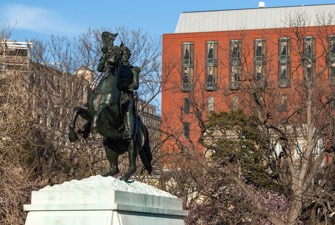Each week, we succinctly summarize the preceding week of Federal Circuit precedential patent opinions. We provide the pertinent facts, issues, and holdings. Our Review allows you to keep abreast of the Federal Circuit’s activities – important for everyone concerned with intellectual property. We welcome any feedback you may provide.
– Joe Robinson, Bob Schaffer, Lindsay Henner, Parker Hancock, and Puja Dave
81-1. A District Court May Enhance “Lodestar” Attorneys Fee Award Only For Relevant Reasons
Lumen View Tech. LLC v. Findthebest.com, Inc., No. 2015-1275, 2015-1325, 2016 U.S. App. LEXIS 1087 (Fed. Cir. January 22, 2016) (Before Lourie, Moore, and Wallach, J.) (Opinion for the court, Lourie, J.). Click Here for a copy of the opinion.
Lumen View sued Findthebest.com (“FTB”) for infringing a patent directed to a method for facilitating bilateral and multilateral decision-making. FTB’s website included an “AssistMe” feature providing visitors with personalized purchase recommendations. The district court granted FTB’s judgment for motion on the pleadings, holding that the patent was directed to an abstract idea and therefore invalid under 35 U.S.C. § 101. FTB moved for attorney fees on the grounds that this case was exceptional under 35 U.S.C. § 285. The district court granted the motion, concluding that the suit was frivolous and objectively unreasonable and that Lumen View’s motivation to sue was to extract a nuisance settlement from FTB.
Based on several factors, including the need to deter the plaintiff’s predatory strategy and frivolous nature of its claims, the district court held that a “lodestar” fee award was insufficient to deter similar misconduct in the future. The lodestar method determines a fee award by multiplying a reasonable hourly rate by a reasonable number of hours required to litigate a comparable case. Here, the court enhanced the lodestar amount by a multiplier of two. Lumen View appealed.
 The Court held that under Octane Fitness LLC v. ICON Health & Fitness, Inc., 134 S. Ct. 1749 (2014), an exceptional case “stands out from others with respect to the substantive strength of the party’s litigating position…or the unreasonable manner in which the case was litigated.” The district court maintains discretion in making its determination, considering the totality of the circumstances. The Court found there was no abuse of discretion by the district court in finding the case exceptional or in awarding attorney fees. The Court held that even if Lumen’s conduct was not quite sanctionable, its unreasonable conduct sufficed as “exceptional” to justify attorney fees under Octane. The Court affirmed the district court’s finding of exceptionality, noting that Lumen’s allegations of infringement were ill-supported, rendering the lawsuit baseless.
The Court held that under Octane Fitness LLC v. ICON Health & Fitness, Inc., 134 S. Ct. 1749 (2014), an exceptional case “stands out from others with respect to the substantive strength of the party’s litigating position…or the unreasonable manner in which the case was litigated.” The district court maintains discretion in making its determination, considering the totality of the circumstances. The Court found there was no abuse of discretion by the district court in finding the case exceptional or in awarding attorney fees. The Court held that even if Lumen’s conduct was not quite sanctionable, its unreasonable conduct sufficed as “exceptional” to justify attorney fees under Octane. The Court affirmed the district court’s finding of exceptionality, noting that Lumen’s allegations of infringement were ill-supported, rendering the lawsuit baseless.
The Court reviewed the attorneys fee award for an abuse of discretion, noting that in “exceptional” cases, a district court may enhance the lodestar amount based on factors that are not accounted for by the lodestar calculation. The Federal Circuit held that the district court failed to provide a proper justification for enhancing the amount by a multiplier of two. The basis for this multiplier was the court’s expeditious resolution on the merits which resulted in an “extremely low” lodestar, and had the court adopted Lumen View’s proposed schedule, FTB would have incurred more attorney fees. The Court disagreed with this as a rationale for enhancing the lodestar amount. The Court held an award can be enhanced only when it fails to account for a relevant consideration. Here, factors such as the expedited schedule were unrelated to the compensation of FTB’s attorneys and therefore, irrelevant to the enhancement of the lodestar. Accordingly, the Court vacated the attorney fee award and remanded the case on these grounds.

![[IPWatchdog Logo]](https://ipwatchdog.com/wp-content/themes/IPWatchdog%20-%202023/assets/images/temp/logo-small@2x.png)



![[Advertisement]](https://ipwatchdog.com/wp-content/uploads/2024/03/IP-Copilot-Apr-16-2024-sidebar-700x500-scaled-1.jpeg)
![[Advertisement]](https://ipwatchdog.com/wp-content/uploads/2024/04/Patent-Litigation-Masters-2024-sidebar-early-bird-ends-Apr-21-last-chance-700x500-1.jpg)

![[Advertisement]](https://ipwatchdog.com/wp-content/uploads/2021/12/WEBINAR-336-x-280-px.png)
![[Advertisement]](https://ipwatchdog.com/wp-content/uploads/2021/12/2021-Patent-Practice-on-Demand-recorded-Feb-2021-336-x-280.jpg)
![[Advertisement]](https://ipwatchdog.com/wp-content/uploads/2021/12/Ad-4-The-Invent-Patent-System™.png)







Join the Discussion
No comments yet.